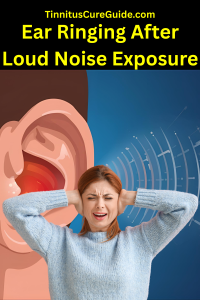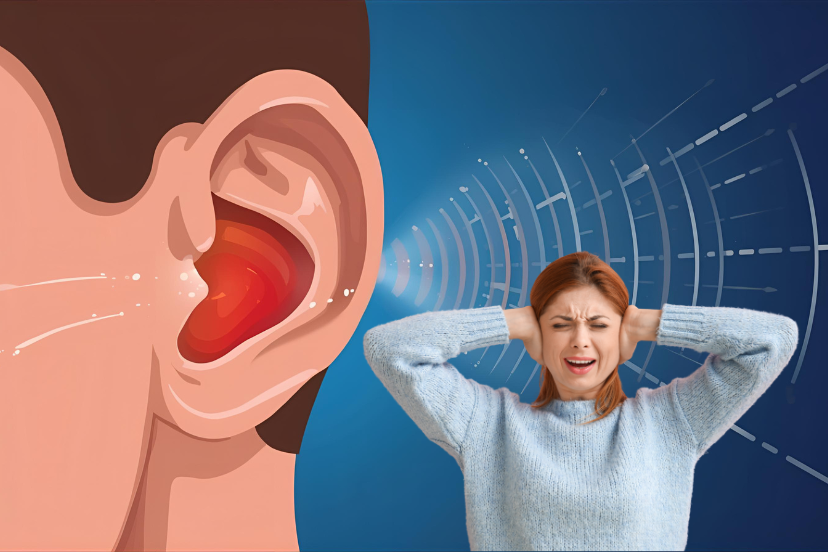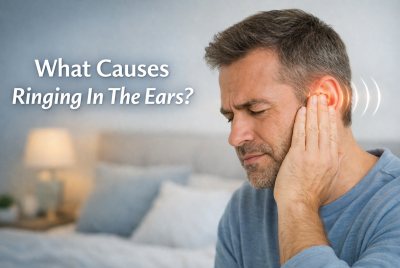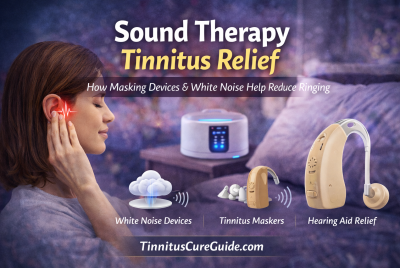Ear Ringing After Loud Noise Exposure: Causes, Relief, and Prevention
If you’ve ever left a concert, sports game, or loud work environment with a high-pitched ringing in your ears, you’ve experienced tinnitus after noise exposure. This temporary (or sometimes lasting) ear buzzing sound can be unsettling—especially if it lingers for hours or even days. For many, the first time it happens is scary. You may wonder: Is this permanent? Will it go away? Do I need to see a doctor? The truth is that ear ringing after loud noise exposure is a common sign that your ears have been stressed. In some cases, it’s temporary; in others, repeated exposure can lead to chronic tinnitus or even permanent hearing loss.
In this article, we’ll break down the causes, symptoms, treatments, and prevention strategies for ear ringing after noise exposure. You’ll also learn practical coping tips, technology solutions, and when to seek medical help.
What Causes Ear Ringing After Loud Noise Exposure?
When you’re exposed to loud environments—like concerts, fireworks, heavy machinery, or even headphones at high volume—sound waves can damage the tiny hair cells inside your cochlea (inner ear). These hair cells convert sound vibrations into signals your brain interprets as hearing.
If they become overworked or damaged, the brain may compensate by creating “phantom sounds.” That’s why you hear ringing, buzzing, or whooshing in ears even when the environment is quiet.
Risk Factors That Increase Noise-Induced Ear Ringing
-
Volume and Duration: The louder and longer the noise, the greater the risk.
-
Proximity to Sound: Standing near speakers, fireworks, or sirens amplifies damage.
-
Lack of Ear Protection: Not using earplugs or earmuffs increases vulnerability.
-
Workplace Exposure: Construction workers, factory staff, and military personnel face higher risks.
-
Lifestyle Choices: Frequent concertgoers, clubbers, and gamers with loud headsets often experience repeated episodes.
Symptoms of Noise-Induced Tinnitus
The primary symptom is a persistent or temporary ringing in ears. But it may also present as:
-
Buzzing or humming
-
Whooshing in ears (like rushing air)
-
High-pitched ear noise
-
Ear fullness or muffled hearing
-
Sensitivity to everyday sounds
While most cases fade within 24–48 hours, constant ear ringing may indicate more permanent damage.
How Long Does Ear Ringing After Loud Noise Exposure Last?
-
Temporary tinnitus: Often resolves in a few hours or days.
-
Sudden tinnitus: May follow one loud event (like fireworks) and last for days or weeks.
-
Chronic tinnitus: Repeated exposure without protection can lead to permanent ringing or hearing loss.
A 2022 report from the CDC estimated that over 22 million U.S. workers are exposed to hazardous noise yearly, making prevention critical.
Treatments for Ear Ringing After Loud Noise Exposure
While there’s no universal “cure,” many strategies help reduce symptoms and improve quality of life.
1. Immediate Relief Steps
-
Move to a quiet environment to let your ears rest.
-
Hydrate to improve circulation.
2. Medical Treatments
-
Audiologist evaluation to check for hearing loss.
-
Hearing aids for tinnitus with sound-masking features.
-
Sound masking devices to reduce the perception of ringing.
3. Natural Tinnitus Treatment Options
-
Supplements: Magnesium, zinc, and ginkgo biloba may support ear health (consult your doctor first).
-
Relaxation therapy: Deep breathing, yoga, and meditation reduce stress—a major tinnitus trigger.
-
Physical therapy: For cases linked to cervical tinnitus causes (neck or jaw tension).
4. Technology Aids
-
Tinnitus sound therapy apps: Widex Zen, ReSound Relief, or Calm.
-
White noise for tinnitus: Machines or apps help mask ringing at night.
Prevention Tips: Protecting Your Hearing
Protecting your hearing is the most effective way to prevent ear ringing after loud noise exposure and reduce your long-term risk of chronic tinnitus. Since noise-induced hearing damage is irreversible, consistent prevention is key.
1. Use Ear Protection in Loud Settings
-
Invest in high-quality earplugs or noise-canceling earmuffs when attending concerts, working in construction, or using power tools.
-
Musicians and frequent concert-goers can benefit from custom-fitted musician’s earplugs that lower volume while preserving sound clarity.
2. Follow the 60/60 Rule for Headphones
-
Keep music volume at 60% or lower of maximum capacity.
-
Limit listening time to no more than 60 minutes at a stretch, then give your ears a break.
3. Give Your Ears Recovery Time
-
After a noisy event, spend several hours in a quiet environment.
-
The ears need 16–18 hours to fully recover from one loud concert or sports event.
4. Choose Quieter Lifestyle Alternatives
-
Lower TV, radio, and headphone volumes.
-
Opt for noise-reducing household appliances like quieter blenders, vacuum cleaners, or fans when possible.
5. Regular Hearing Check-Ups
-
Schedule annual hearing tests, especially if you work in noisy environments or enjoy loud hobbies.
-
Early detection of hearing changes allows for faster intervention and protection strategies.
6. Watch for Everyday Noise Triggers
-
Lawn mowers, hair dryers, and even city traffic can contribute to long-term ear strain.
-
Using protective gear or limiting exposure to these noises helps reduce cumulative damage.
7. Maintain a Healthy Lifestyle
-
Eat a balanced diet rich in antioxidants and magnesium, which support ear health.
-
Avoid smoking and excessive alcohol, both of which can worsen tinnitus risk.
Coping Strategies for Persistent Ear Ringing
If your ringing becomes chronic tinnitus, you can still manage symptoms effectively:
-
Establish sleep routines: Use white noise or a fan to block ear ringing at night.
-
Try mindfulness: Meditation and CBT (cognitive behavioral therapy) reduce distress.
-
Support groups: Online tinnitus communities offer emotional support.
-
Exercise regularly: Improves circulation and lowers stress.
When to See a Doctor
Seek professional care if:
-
The ringing lasts longer than a few days.
-
You notice sudden hearing loss.
-
The sound is pulsatile tinnitus (beats with your heartbeat).
-
Ear ringing is accompanied by dizziness, pain, or pressure.
FAQs About Ear Ringing After Loud Noise Exposure
1. How long does ear ringing last after a loud concert?
Most cases fade within 24–48 hours. If ringing continues beyond a few days, it may indicate lasting damage to the inner ear. In such cases, consulting an audiologist or ENT is strongly recommended.
2. Can ear ringing from loud noise be permanent?
Yes. Repeated exposure to loud noise without ear protection can cause permanent tinnitus and hearing loss. While temporary ringing may fade, chronic tinnitus develops when hair cells in the ear are permanently damaged and cannot recover.
3. What helps stop ringing in ears after noise exposure?
Move to a quiet place, hydrate, and avoid stimulants like caffeine or alcohol. Using white noise machines, sound therapy apps, or hearing aids with masking features may reduce perception. Persistent symptoms require medical consultation and hearing evaluation.
4. Is ringing in the ears a sign of hearing loss?
Not always, but it can be an early indicator. Temporary ringing after noise exposure may fade. However, if ringing is constant, worsening, or accompanied by muffled hearing, it could suggest measurable hearing damage requiring professional assessment.
5. Can stress make ear ringing worse?
Yes. Stress often intensifies tinnitus by increasing nervous system activity, making ringing more noticeable. Relaxation techniques like deep breathing, meditation, or yoga can help reduce severity. Managing anxiety and maintaining healthy sleep routines often make symptoms more manageable.
6. What are the best supplements for tinnitus after noise exposure?
Magnesium, zinc, and ginkgo biloba are commonly discussed for tinnitus support, but scientific evidence is mixed. Supplements may support ear health, but should not replace medical treatment. Always consult a healthcare professional before beginning any supplement regimen.
7. When should I see a doctor for noise-induced tinnitus?
Seek medical care if ringing lasts beyond a week, worsens, or is accompanied by sudden hearing loss, dizziness, or ear pain. An ENT or audiologist can determine underlying causes and recommend personalized treatment options for tinnitus.
Ear Ringing After Loud Noise Exposure – Conclusion
Experiencing ear ringing after loud noise exposure can be alarming, but in many cases, it’s temporary. Protecting your ears, seeking treatment when needed, and adopting healthy lifestyle habits can significantly reduce the risk of permanent tinnitus.
The takeaway? Guard your hearing today—your future self will thank you.
Disclaimer
This article is for informational purposes only and is not a substitute for medical advice. Always consult a licensed healthcare professional for proper diagnosis and treatment of tinnitus or any hearing-related condition.

- Stiff Shoulders Causing Ear Ringing
- When Neck Tightness Causing Ear Ringing
- Somatic Tinnitus Causes and Treatments





